New energy vehicle company July Sales Report: BYD Hits Record High, Tesla Sales Rebound
According to the CPCA monthly preliminary data comprehensive estimates, in July the national new energy passenger car manufacturers wholesale sales of 950,000 units, up 29% year-on-year, down 3% from the previous year.
The month is the auto industry's traditional off-season, according to the CPCA monthly preliminary data comprehensive estimates, in July the national new energy passenger car manufacturers wholesale sales of 950,000 units, up 29% year-on-year, down 3% from the previous year.
BYD's monthly sales record a record high, Tesla sales rebound
According to official data, BYD's July sales totaled 342,383 units, up 30.60% year-on-year and a slight increase of 0.21% sequentially, breaking the June sales record, hitting a new high again, and realizing five consecutive months of sales exceeding 300,000 units. Among them, passenger car sales amounted to 340,799 units, up 30.50% year-on-year and down 0.2% sequentially.
Among passenger cars, sales of plug-in hybrid electric vehicles (PHEVs) amounted to 210,799 units, up 66.87% year-on-year and 8.08% sequentially, hitting the fifth consecutive record high since March. Pure electric vehicles (BEVs) were 130,000 units, down 3.55 percent year-on-year and 10.46 percent sequentially. Plug-in hybrids remained the mainstay of BYD's growth.
Overseas, BYD sold 30,014 units in overseas markets in July, up 65.19% year-on-year and 11.18% sequentially.
Specifically look at the sales of BYD's various brands. The Dynasty and Ocean series remain BYD's mainstay of sales, with a total of 328,178 units sold in July, up 31.3 percent year-on-year. DENZA, BYD's joint venture with Mercedes-Benz, sold 10,340 units in July, down 17 percent from a year earlier. Among the premium series, FangChengBao sold 1,842 units in July, down 31 percent from a year earlier, while the Yangwang brand sold 439 units in a single month, up 5 percent from a year earlier.
Also in July, BYD announced a new strategic partnership. on July 31, BYD and transportation network company Uber jointly announced a multi-year strategic partnership, with plans to launch 100,000 new BYD electric vehicles in key markets around the world to further expand the lineup of electric vehicles on Uber's platform.
The partnership is said to cover key global markets and will begin in Europe and Latin America before gradually expanding to markets such as the Middle East, Canada, Australia and New Zealand. According to the statement, the two companies will also work together to develop BYD self-driving cars and deploy them on the Uber platform.
Regarding the partnership, Morgan Stanley said that a multi-channel sales strategy is a prerequisite for BYD to realize its global plans. With the growing demand for electric vehicles in the global market, BYD is expected to further expand its business in overseas markets and increase its brand awareness and market share through cooperation with partners such as Uber. This model of cooperation will not only help BYD cope with the uncertainties of the international trade environment, but also provide an opportunity for the company to seek new growth points on a global scale.
Tesla China saw a wave of growth in July. According to the CPCA, Tesla China sold 74,117 electric vehicles in July, up 15.29 percent year-on-year and 4.38 percent sequentially. The figure includes vehicles sold in China and exported from China to overseas markets. According to statistics, Tesla has sold 46,000 vehicles in China in July, a 47 percent jump year-on-year.
Notably, Tesla previously extended its five-year interest-free purchase entitlement until the end of August, which is expected to further stimulate demand.
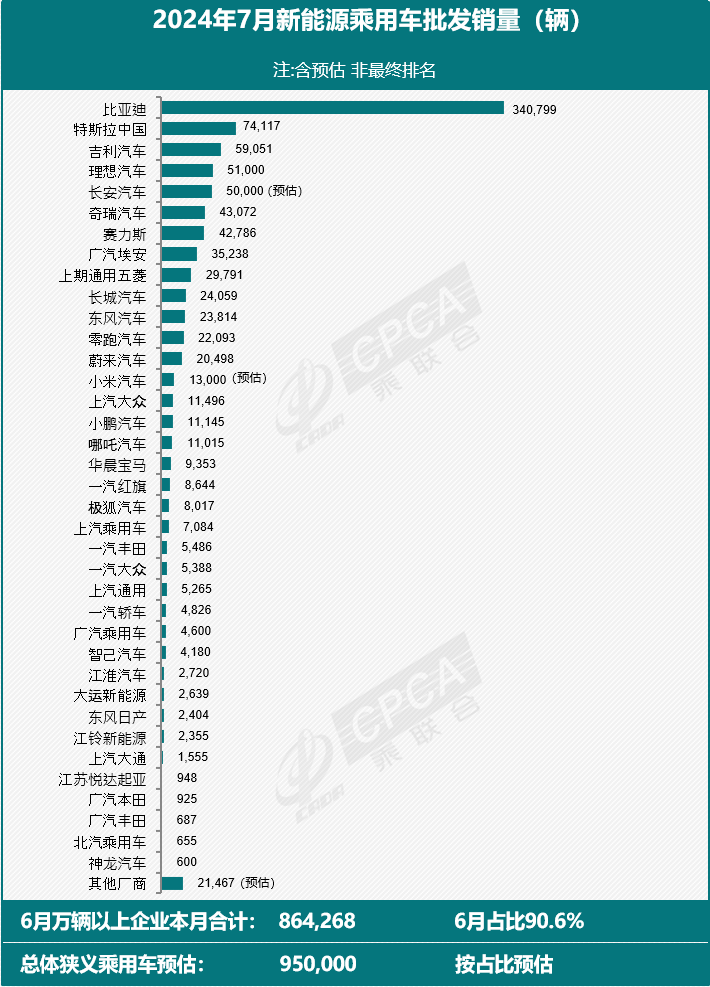
SAIC and GAC Aion both underperform in July
According to data disclosed by Geely Automobile, its sales reached 150,782 units in July, up 13% year-on-year. Of these, 30,858 units were sold as pure electric vehicles and 28,193 units as plug-in hybrids.
ZEEKR cars, Geely's mid-range and premium brand, delivered 15,655 units in July, up 30 percent year-on-year, but down 22 percent from more than 20,000 deliveries last month.
Changan Auto Group sold 207,743 units in July, up 3.4 percent year-on-year. Among them, the independent brand New Energy sold 39,513 units in July, up 68.89 percent year-on-year. Deliveries of DEEPAL vehicles, a highly regarded brand under its umbrella, amounted to 16,721 units in July, an increase of nearly 27 percent year-on-year and essentially flat year-on-year.
SAIC and GAC Aion both underperformed in July.
SAIC sold over 71,000 new energy vehicles in July, down about 22% year-on-year. However, its premium smart brand IM Motors performed well in July, recording a 249 percent year-on-year rise to 6,017 units. In addition, both the SAIC-GM and SAIC-Volkswagen ID. families posted year-on-year growth in July, with the former up 27 percent to 7,901 units and the latter up 6.5 percent to 11,258 units.
GAC Aion's global sales of 35,238 units in July were down 21.7 percent year-on-year and up a modest 0.6 percent sequentially. So far this year, GAC Aion's sales performance has been lackluster. Starting from February, GAC Aion's monthly sales began to decline year-on-year for six consecutive months now.
However, since the YoY sales have stabilized, the GAC Aion is still on the CPCA's list of top new energy passenger car makers and has advanced one place from last month to eighth. Though still in the top 10, it's a far cry from its third-place finish in April.
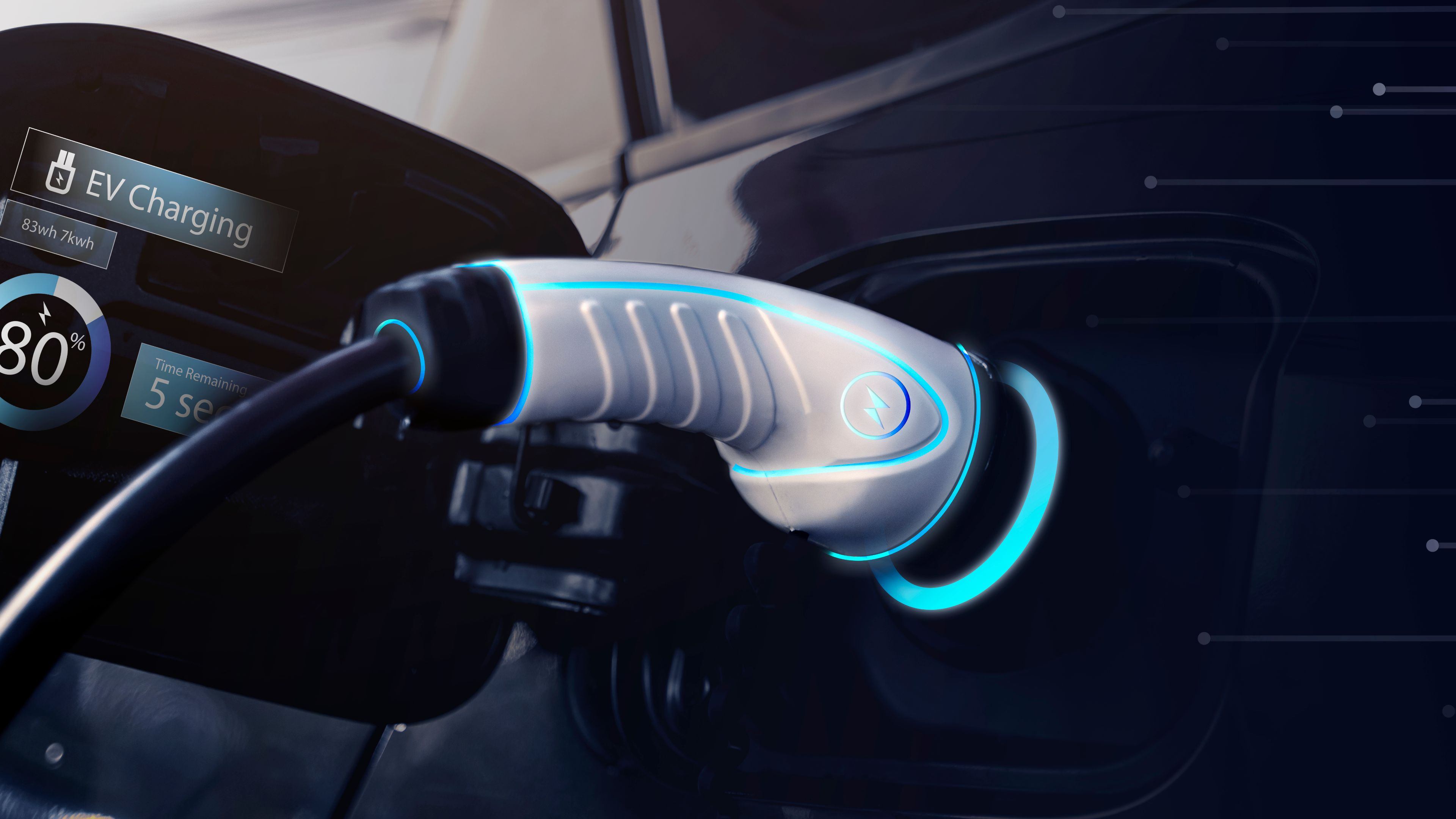
"New forces in car manufacturing"see rapid growth
In July, new car makers continued to grow rapidly and competition intensified again.
Li Auto: In July, Li Auto once again held on to the No. 1 sales position among the "new car makers"; Li Auto said it delivered a total of 51,000 new cars in July, a new record for monthly deliveries, up 49.4 percent year-on-year and 6.8 percent from the same month last year.
●SERES: According to a SERES announcement, new-energy vehicle sales in July totaled 42,176,000 units, surging 508.25 percent year-on-year but slipping about 4.5 percent from the previous month's 44,126 units. From January to July this year, SERES' cumulative sales of new energy vehicles amounted to 243,100 units, up 369.95 percent year-on-year.
●NIO: In July, sales of NIO vehicles stabilized above 20,000 units for the third consecutive month at 20,498 units, essentially flat year-on-year and down 3.4% sequentially.
●Leapmotor: Leapmotor shined in July, delivering 22,093 units, up 54.1% year-on-year to a record high.
●Xpeng: Xpeng Automobile's July sales were 11,145, up 1% year-on-year and 4% sequentially.
● Ne Zha: Ne Zha Auto delivered 11,015 units overall across its entire range in July, up 9.7% year-on-year and 7.9% sequentially. Nezha X was launched in two overseas countries, and orders in Thailand exceeded 1,000 units in 72 hours. It is understood that the new Nezha X and Nezha S Hunter will be launched in August.
●Xiaomi: Xiaomi Automobile said deliveries exceeded 10,000 units in July, and will continue to break this mark in August. xiaomi Automobile also said it expects to achieve its full-year delivery target of 100,000 units ahead of schedule in November.
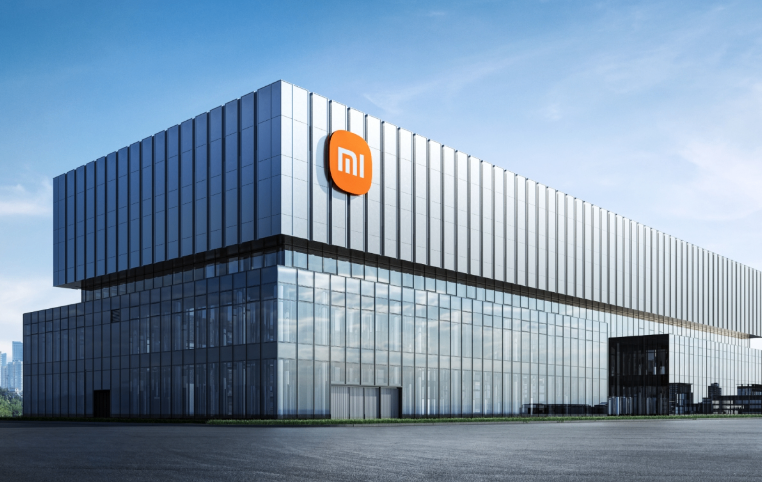
Notably, the second phase of Xiaomi's electric vehicle plant began on July 26th.
A subsidiary of Xiaomi bought land in the Yizhuang Development Zone in southeastern Beijing for 842 million yuan, according to an announcement from the local natural resources department. The deal was struck on July 25 for a 50-year land grant with a land area of 531,130 square meters. In other words, less than 24 hours after the land deal was made, the second phase of Xiaomi's electric car factory started construction.
It is understood that the land is located to the east of Xiaomi's existing factory for electric vehicles and is planned for a smart car and parts production project.
Li Auto weekly chart data controversial again
The weekly sales chart released by Li Auto cars has been controversial. Recently, the list has once again stirred up controversy and has led to a number of car company executives coming down on it themselves.
On July 27, Li Bin, chairman of NIO Auto, and Qin Lihong, president of NIO Auto, expressed their dissatisfaction with the weekly list at the NIO Technology Day. Li Bin said that issuing financial reports are quarterly, and monthly is already cruel. And bluntly said that NIO will say that it will never issue weekly list if it achieves the first place. Qin Lihong also questioned this, "What right does another company (referring to Li Auto) have to use our brand to send out weekly charts, can we be held out."
July 30, NIO Auto Assistant Vice President of Branding and Communications Ma Lin directly in the social media platform microblogging Li Auto's chairman Li Want, said the senior management has been emphasized not to engage in a low level of scrolling, scrolling the weekly list of more or less a little bit of the meaning of the low level of scrolling, advised Li Want to "put it away."
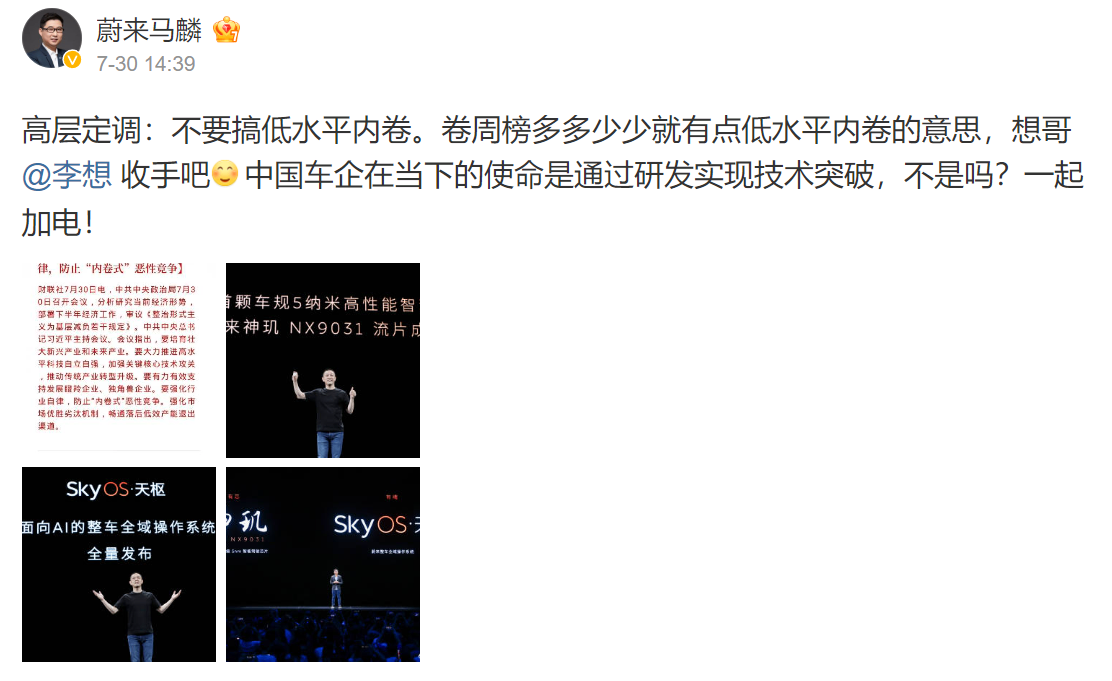
Ma Lin said the high-level tone, referring to the July 30 meeting of the Political Bureau of the Central Committee of the Communist Party of China. The meeting pointed out that to cultivate and grow new industries and future industries ...... to strengthen industry self-regulation, to prevent "involutional" vicious competition.
Yang Xueliang, senior vice president of Geely Holding Group, then retweeted Ma Lin's tweet and said he was equally opposed to the weekly list. Also on the 30th, Xpeng Automobile CEO He Xpeng also in the AI intelligent driving technology conference to show his dissatisfaction with some companies to do weekly sales list, and bluntly said, "This is not the way the technology competition should be."
A number of car companies have been dissatisfied with the weekly list for a long time, because they believe that in their opinion, there are a number of irrationalities in the weekly sales list issued by Li Auto cars.
One is the source of the data. both NIO and Xpeng Auto have expressed their doubts about the data in the weekly list. However, Li Auto has said that the source of the data is the insurance volume of the CAC terminal retail, not the sales and delivery volume. Another is that this kind of short-term data is easy to mislead some consumers, which is not conducive to the sustainable development of car companies with poor sales in the short term.
There has been no official response from Li Auto to the controversy. However, on July 31st, Li wanted to post a picture of the fable "Covering up the ears and stealing the bell" in his WeChat circle of friends, which was interpreted by the outside world as a response to the controversy over the weekly list.
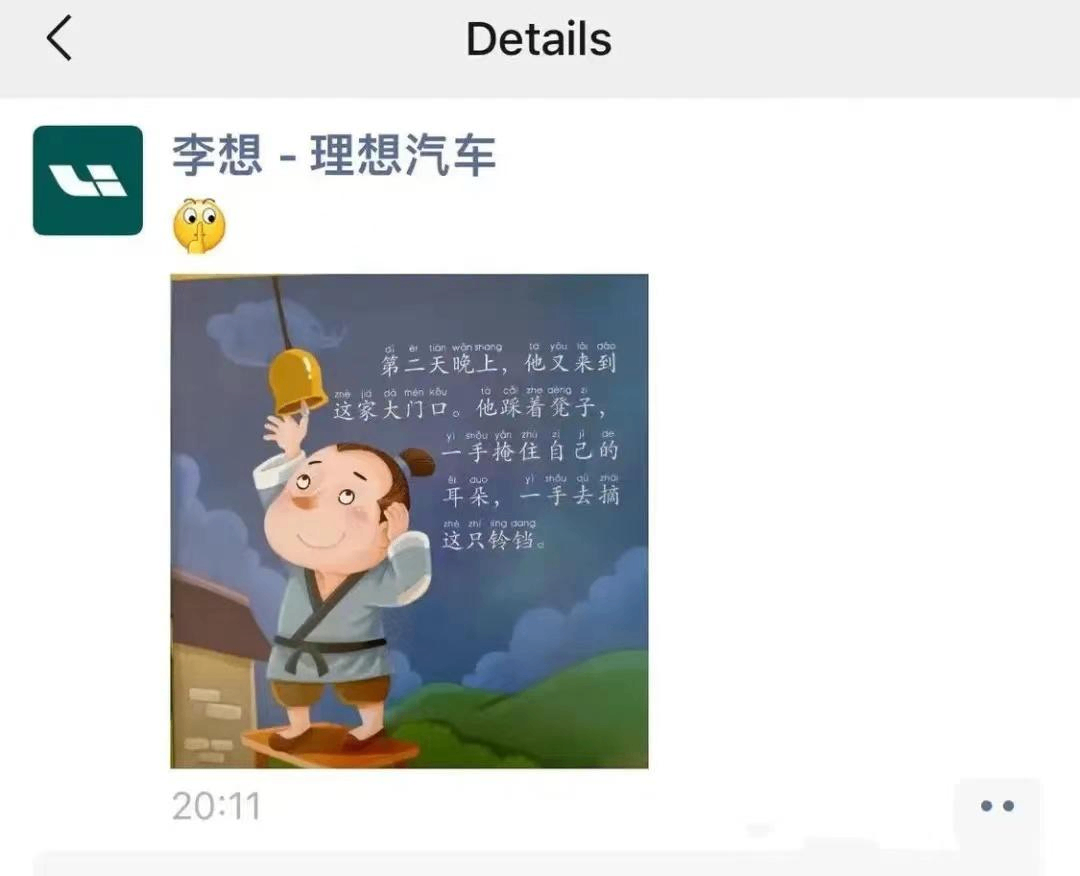
Trade-in" policy to increase again
On July 25, the National Development and Reform Commission (NDRC) and the Ministry of Finance (MOF) issued the "Several Measures on Supporting Large-Scale Equipment Renewal and Consumer Goods Trade-in", which mentioned that the subsidy standard for automobile scrapping and renewal will be raised. Under the new subsidy standard, the subsidy for purchasing new energy passenger cars will be increased from 10,000 yuan to 20,000 yuan; the subsidy for purchasing fuel-powered passenger cars with a displacement of 2.0 liters or less will be increased from 7,000 yuan to 15,000 yuan.
The "trade-in" has been effective in stimulating market demand. As of noon on July 25, the auto trade-in information platform had received 364,000 applications for vehicle scrapping and renewal subsidies, with more than 10,000 new applications added in a single day, a sharp increase in the number of declarations reflecting the encouraging effect of scrapping and renewal.
CPCA expects that with the update of the subsidy standard, the consumer enthusiasm of the new energy vehicle market will be further stimulated, and the market performance of plug-in hybrids and extended-range vehicles will be further strengthened, and the year-on-year decline in terminal sales in the automobile market will be further narrowed in July, showing the trend of "off-season is not slow", and the benefit of new energy vehicles will be especially obvious.
CPCA Secretary General Cui Dongshu also said: "the subsidy standard adjustment will have a significant pull effect, there should be about 2 million private cars scrapped, the daily average should be nearly 20,000, compared with the current daily average of nearly 10,000 units will have a significant increase."
·Original
Disclaimer: The views in this article are from the original Creator and do not represent the views or position of Hawk Insight. The content of the article is for reference, communication and learning only, and does not constitute investment advice. If it involves copyright issues, please contact us for deletion.